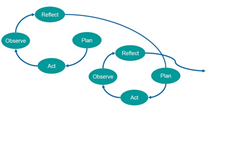The objective of Action Research for Learning was to strengthen the capacities of the selected partners for action research, analysis, reporting and learning.
Published on: 22/03/2016
The Action Research for Learning programme was a three-year initiative (2013–2015), led by IRC, to improve the effectiveness of existing hygiene promotion and community empowerment programmes of selected local Dutch WASH Alliance partners in Bangladesh, Ethiopia, Ghana and Uganda. In Ethiopia and Bangladesh, the focus was on hygiene promotion, while in Ghana and Uganda the focus was on community empowerment interventions. The objective of Action Research for Learning was to strengthen the capacities of the selected partners for action research, analysis, reporting and learning; to enhance community-based monitoring on community empowerment in of water, sanitation and hygiene (WASH) services; and to promote understanding, harmonisation and coordination among district and local governments and local NGOs for effective community empowerment in WASH. All of these objectives have been met in principle, in terms of both the action research process and the development of interventions.
For me, being part of this programme in a later phase was great experience allowing me to visit programme communities in Ghana and Ethiopia a few times. My role was to accumulate the lessons learnt from all four countries smoothly which went well as there was a qualified key consultant in each of the countries who worked with the country teams.
What is clear from this programme is that the sanitation and hygiene innovations requested by the communities have taken off. Since these were requested by the communities and will be maintained by the community, the likelihood for these services to continue over time is realistic. If there is a second phase in the programme, the role of local government in implementing the WASH interventions could be a possible further angle that could be taken in creating long term sustainability of these interventions. This would entail embedding the interventions within the local government structures, a move that would allow for scaling up the interventions and ensuring their sustainability, although the level and degree to which local government stakeholders would be involved would inevitably depend on the country context.
What is less clear in this programme is how the action research will be further taken up as the programme has come to an end. Within the context of this programme, the initiative aimed to complete three cycles of action research in all four countries: planning an intervention to be jointly tested in the field, taking action, observing the results, then reflecting on the achievements and shortcomings of the tested intervention. Each cycle was intended to be concluded in one year period.

The process involved six steps:
Step 1. Data collection, data entry and analysis
Step 2. Review of agreed-upon adjustments to intervention or activity
Step 3. Review of implementation of community-based monitoring, evaluation of results
Step 4. Sense-making
a) Making sense of individual outcomes
b) Making sense of whole activity, evaluating progress in achieving planned outputs, identifying any necessary adjustments
Step 5. Synthesis of lessons for sharing with district stakeholders
Step 6. Facilitating learning event with district stakeholders
Although all of these steps were undertaken in each of the countries, it is still questionable how much of these lessons will continue to reside with the country teams over time. Really the only means of clearly analysing if this part of the programme has succeeded would be to have the opportunity to test each of the country teams’ knowledge and analysis skills over time. With the aspiration of a second phase of this programme next year, this critical part could be further analysed to reflect long term sustainability. The other critical element that continues to play a strong role not only in this programme but others I have been involved in the past is the high turnover of staff during the period of the programme. In the case of all countries, except for Ethiopia, there were only one or two staff members who have stayed with the programme throughout the three years. This in essence means that any local capacity building, in this case the understanding and undertaking of action research, goes amiss as there is a lack of institutional memory. How to solve this issue is more difficult to answer - but within the context of this programme, a strong recommendation in the second phase would be to provide enough extrinsic incentives (e.g. salaries, etc.) that will ensure that a higher percentage of staff will stay on throughout the second phase of the programme.
A second phase would also provide an opportunity to integrate lessons learnt from this phase, in both administration and content. The action research process could then be made more effective and aligned with existing planning and reviewing processes of local government institutions, improving resource allocation and delivering WASH services that last.
At IRC we have strong opinions and we value honest and frank discussion, so you won't be surprised to hear that not all the opinions on this site represent our official policy.